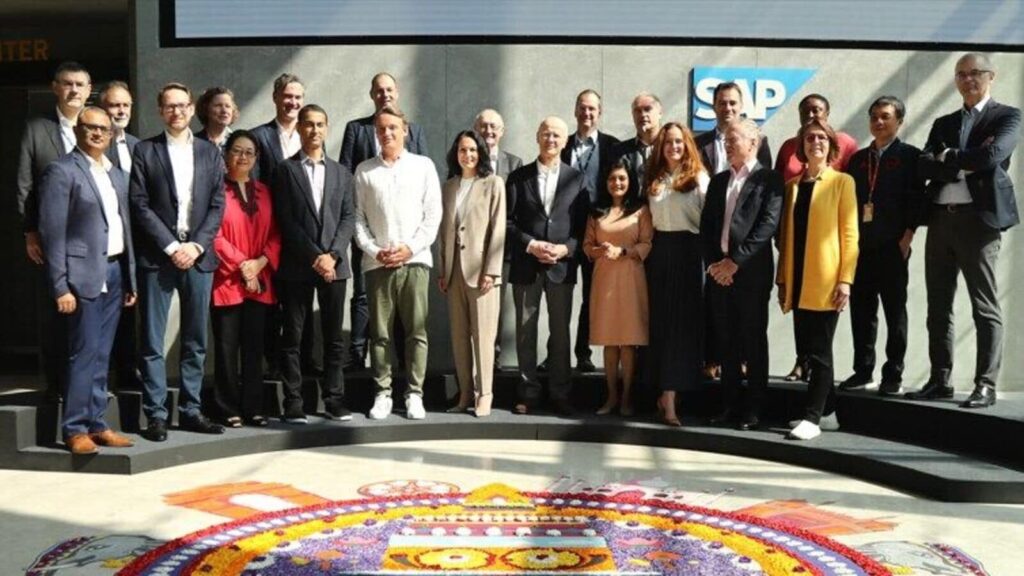German software maker SAP SE believes artificial intelligence (AI) will create new jobs even as the rise of new technologies overshadows jobs performed by humans.
“We believe that AI improves productivity and creates more jobs. We are working with our partners to leverage AI to improve project productivity.” Muhammad Alam, executive director of product engineering, said this during a media roundtable at the company’s research and development (R&D) lab in Bangalore. on wednesday.
“AI can help accelerate migration and reduce implementation costs, further driving business growth,” said Alam.
CEO Christian Klein echoed this sentiment, saying that as AI-powered businesses grow, the need for developers will increase and India’s development workforce will also grow.
“India’s economy is rapidly diversifying, and all of these customers need software. That’s a good place for the technology industry,” said Klein, who took over as chief executive in April 2020. He spoke during an interaction with the media. “Currently, we can code this software faster and be more productive, but we need to code more software. And as long as this is the case, we will also make further investments. And Here too, India’s development workforce will grow further.”
“Although it may seem like AI reduces the number of people performing certain tasks, we need to understand that it enables more work to be done across multiple technologies.” , said Ashutosh Sharma, Vice President and Director of Research. Forester Research. He added that AI will help increase spending on technology across organizations and create new jobs as companies invest in new technologies enabled by AI.
SAP is a software manufacturer headquartered in Walldorf, Germany that provides software for the world’s largest companies to manage business processes such as human resources, finance, supply chain management, and inventory.
The SAP board’s lively remarks on AI contrast with those of Sundar Pichai, CEO of Google’s parent company Alphabet, whose comments on a post-earnings conference call with analysts included the hiring of programmers. is sounding the alarm.
“We also use AI internally to improve our coding processes and increase productivity and efficiency. Today, more than a quarter of all new code at Google is generated by AI and then translated by engineers. It has been reviewed and accepted,” Pichai said on an Oct. 29 call with analysts after the company released financial results for the quarter ending September 2024.
Back home in India, the chief executives of the country’s largest software services companies have sought to allay investor concerns about the threat to jobs from generative AI (GenAI).
“ChatGPT got a lot of interest early on, but people are slowly starting to realize that it’s most useful for certain kinds of problems. , people are realizing that they’re going to need humans,” Kritivasan, CEO of Tata Consultancy Services, India’s largest software services company, said in an interview with Mint on July 12. Ta.
With the launch of ChatGPT nearly two years ago, GenAI rose to prominence and into corporate boardroom discussions with its video, audio, and written content generation capabilities.
Krithivasan’s colleague Salil Parekh, CEO of Infosys Ltd, echoed similar sentiments. “So, my feeling at this stage is that (AI) technology, as opposed to anything else, is going to help the business grow further.With these new-age technologies, Infosys has reduced headcount and I don’t see any,” Parekh said in an interview to PTI on August 26.
These comments are important for India, where at least one million engineering students graduate every year. The surge in demand due to new technologies will lead to changes in the skillsets required of graduates.
Prompted engineers are an industry term for programmers who are adept at instructing AI models to produce the best results, and are in high demand from large companies eager to hire talent with GenAI-ready skill sets. Mint reported on March 13th.
For now, the benefits of AI are not yet clear, as most domestic companies, unlike global peers Accenture and IBM, avoid disclosing revenue from new technologies.
IBM’s book of business (reservations and actual sales) related to GenAI was over $2 billion as of July 2024, while Accenture, the world’s largest software services company, has a fiscal year ending August 2024. Reported Gen AI bookings for the year to be $3 billion. .
In his address to shareholders at the company’s 43rd annual general meeting, Infosys Chairman Nandan Nairukani said that adoption of Gen AI in large enterprises will be slower than in consumer companies.
“The world is in the very early stages of the AI revolution, and unlike consumer AI, which is deployed quickly, enterprise AI requires companies to make big changes internally, organize data, build responsible systems, and comply with laws. in many countries, etc. So it will take several years for enterprise AI to roll out,” Nairkani said on July 1, 2024.
For SAP, just over half of its revenue is driven by its cloud business. The company reported sales of $9.06 billion for the July-September period of 2024, of which the cloud business alone accounted for $4.66 billion.
Get all the business news, company news, breaking news events and latest news updates on Live Mint. Download the Mint News app for daily market updates.
morefew



